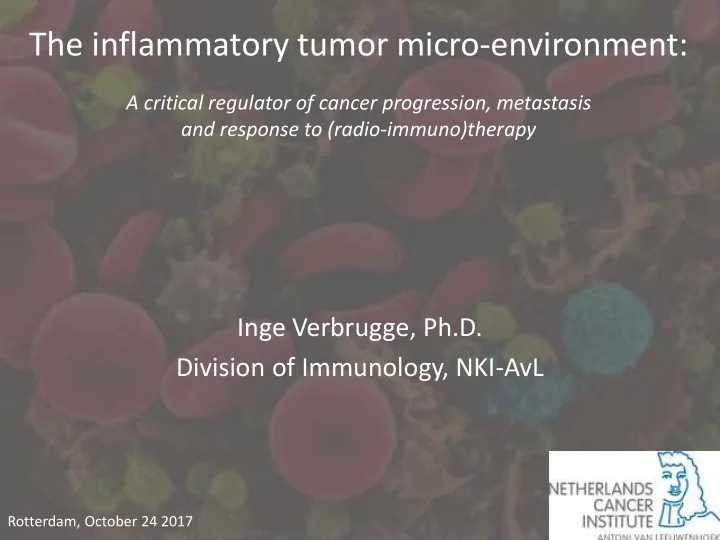

The inflammatory tumor micro-environment: A critical regulator of cancer progression, metastasis and response to (radio-immuno)therapy Inge Verbrugge, Ph.D. Division of Immunology, NKI-AvL Rotterdam, October 24 2017
Slide: Seth Coffelt
Major components of the tumor micro-environment 4. Extracellular matrix 1. Tumor vasculature 2. Cancer-associated fibroblasts 3. Inflammatory cells Klemm F and Joyce JJ Trends in Cell Biology 2015; 25:198-213
1863: First hypothesis linking inflammation and cancer development Rudolf Virchow (1821-1902) German Pathologist
Inflammatory tumor micro-environment in human invasive breast cancer Image: Seth Coffelt
Slide: Seth Coffelt
Immune system and cancer: A double-edged sword Pro-tumor Anti-tumor
Chronic inflammation can promote tumorigenesis Slide: Seth Coffelt
Anti-inflammatory drugs prevent tumor recurrence Sandler RS et al. New Engl. J. Med 2003;348:891-899
Influx of innate immune cells correlates with poor prognosis Macrophages in Hodgkin’s lymphoma Macrophages in breast cancer Leek RD et al., Cancer Res 1996;56:4625-4629 Steidl C et al., NEJM 2010;362:875-885
Immune system and cancer: A double-edged sword Pro-tumor Anti-tumor
Impaired immune responses correlates with high cancer incidence De Visser KE et al., Nat Rev. Cancer 2006;6:24-37
High-density TILs correlate with survival advantage in colorectal tumors Galon J et al., Science 2006;313:1960-1964
Paradoxical roles of the immune system during cancer development Slide: Seth Coffelt
Cancer cells must evade anti-tumor immune response Chen and Mellman Immunity 2013;39:1-10
Cancer immunoediting: from immunosurveillance to escape Strausberg RL et al., Genome Biol. 2005;6:211
Establishment of inflammatory tumor micro-environment “Wounds that never heal” Quail DF and Joyce JA, Nature Medicine 2013;19:1423-1437
Controversial role of the immune system during cancer development Cancer Anti-tumor Growth immunity Chronic inflammation Tissue homeostasis What have experimental studies taught us regarding the role of the immune system during cancer development?
Inflammatory tumor micro-environment • Cancer development/progression • Metastasis formation • Response to therapy
Inflammatory tumor micro-environment • Cancer development/progression • Metastasis formation • Response to therapy
Macrophage infiltration in breast cancer Slide: Seth Coffelt
Macrophages contribute to cancer progression
Conversion innate immune cells during tumor development Hagerling C. et al., Trends Cell Biol 2015;25:214-220
Inflammatory tumor micro-environment • Cancer development/progression • Metastasis formation • Response to therapy
Seed-and-Soil Hypothesis • In 1889, Paget noticed that metastasis was more frequent in certain organs and proposed it was not random • Metastasis results from signaling between cancer cell (seed) and organ microenvironment at metastatic sites (soil) “When a plant goes to seed, it seeds are carried in all directions; but they can only live and grow if they fall on congenial soil.” - Stephen Paget, 1889 Paget S. Cancer Metastasis Rev. 1989;8:98-101 Lanley RR et al., Int J Cancer 2011;128;2527-2535
Macrophages enhance breast cancer metastasis formation Lin E.Y. et al., J. Exp. Med 2001;193:727-740
Immune cell infiltration in breast cancer Slide: Seth Coffelt
Neutrophils enhance breast cancer metastasis formation Coffelt SB et al., Nature 2015;522:345-348
γδ T cell-IL17-neutrophil axis promotes metastatic breast cancer Coffelt SB et al., Nature 2015;522:345-348
Inflammatory tumor micro-environment • Cancer development/progression • Metastasis formation • Response to therapy
Intrinsic or acquired contributions of the TME to therapy response Klemm F. and Joyce JJ (2015) Trends in Cell Biology 25: 198-213
Radio-immunotherapy: concept Blocking coinhibition Radio-immunotherapy promise: α -PD-1, α -CD137 Achieving SYSTEMIC synergism by combining LOCAL radiotherapy with immune-modulation Costimulation Verbrugge I et al., Cancer Res 2012;72:3163-3174 Verbrugge I et al., Radiation Res 2014;82:219-229
Radio-immunotherapy in GEMM (melanoma) Tyr::CreERT2;Pten loxP/loxP ;BRAF CA/+ transgenic mice • Tamoxifen administration to the skin PTEN loss, expression of mutant BRAF in melanocytes – Driver lesions representative of melanoma, mutational load is NOT – Hooijkaas A et al., Am J Pathol;181:785-794
Efficacy of radio-immunotherapy in spontaneous melanoma? Radiotherapy + α -CD137 / α -PD-1 mAbs delays tumor outgrowth • Targeting α -CTLA-4/ α -PD-1, IL-2, CD27 not effective – Control Radiotherapy Tumor doubling time (days) Kroon P et al., Cancer Immunol Immunother 2016;65:753-763
T cell infiltration in TME following radio-immunotherapy Kroon P et al., Cancer Immunol Immunother 2016;65:753-763
Radio-immunotherapy enhances local tumor control α -PD-1 α -PD-1, α -CD137 α -CD137
Cancer therapy: kill tumor cells AND tip the balance in the TME in favor of anti-tumor immunity Cancer Anti-tumor Growth immunity Chronic inflammation Tissue homeostasis
Conclusion/discussion • Cancer development/progression – Upon loss of tissue homeostasis, tumor cells facilitate formation of inflammatory TME that supports tumor development/progression • Metastasis formation – Inflammation provides ‘soil’ at pre-metastatic niches for cancer cells ‘seeds’ to disseminate and grow • Response to therapy – Curative therapy may require tumor cell kill AND attenuation of TME to favor tissue homeostasis/anti-tumor immunity Highly dependent on e.g. genetic make-up, cell of origin and location of tumor, (immune) status of patients, requires personalized (therapy) approaches!
Acknowledgements Division of Tumor Biology Department of Radiotherapy and Immunology Artem Khmelinskii Paula Kroon Marcel Verheij Elselien Frijlink Victoria Iglesias Juntendo University (Tokyo, Japan) Seth Coffelt Hideo Yagita (antibodies) Karin de Visser NKI core facilities Blank group Jules Gadiot Marcel Deken De Visser group Jannie Borst
Recommend
More recommend